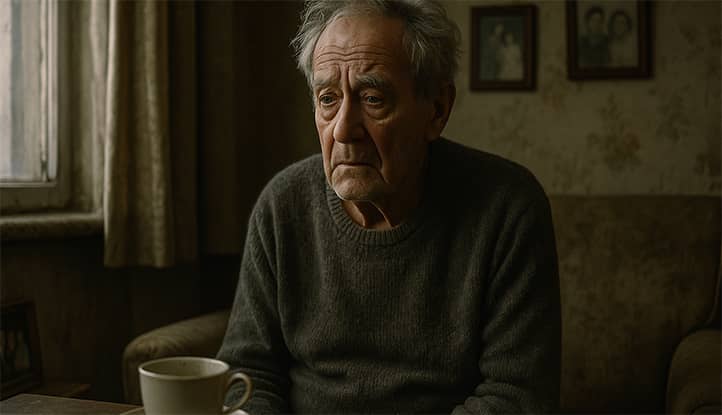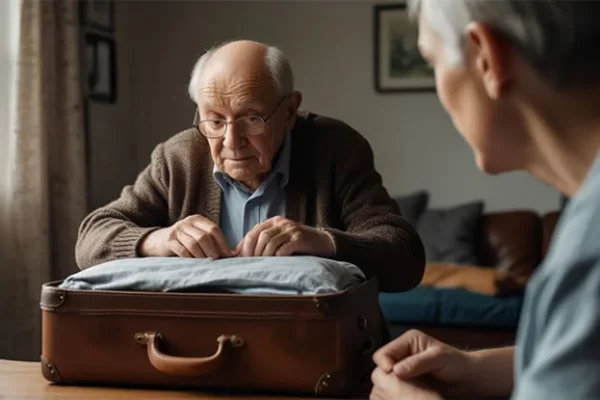Senile dementia is not just forgetfulness or the quirks of old age, but a serious cognitive impairment in which the brain gradually loses its ability to think, remember, and even recognize loved ones. In medicine, this condition is often associated with dementia, Alzheimer’s disease, or the consequences of chronic illnesses, but in society, it is often dismissed as “natural” signs of aging. However, behind this term lies a harsh reality: a person loses connection with the world around them, and their relatives face emotional burnout and a sense of helplessness.
The problem is becoming increasingly urgent against the backdrop of an aging population: according to WHO, by 2050 the number of people with dementia may exceed 150 million. Even now, every family with elderly relatives risks facing progressive memory loss, illogical behavior, or even aggression. But even more frightening is the lack of understanding — many realize the seriousness too late, when the disease has already progressed. How can you distinguish early warning signs from ordinary age-related absent-mindedness? Is it possible to slow down brain deterioration or at least prepare for it? And most importantly — how can you preserve dignity and quality of life when your mind begins to betray you?
These questions are rarely asked out loud, with aging often discussed in abstract terms. But right now, as the baby boomer generation enters old age, it is crucial to dispel myths and understand: senile dementia is not inevitable. It can be delayed, and in some cases — even prevented. But to do so, you must know the enemy and act in advance.
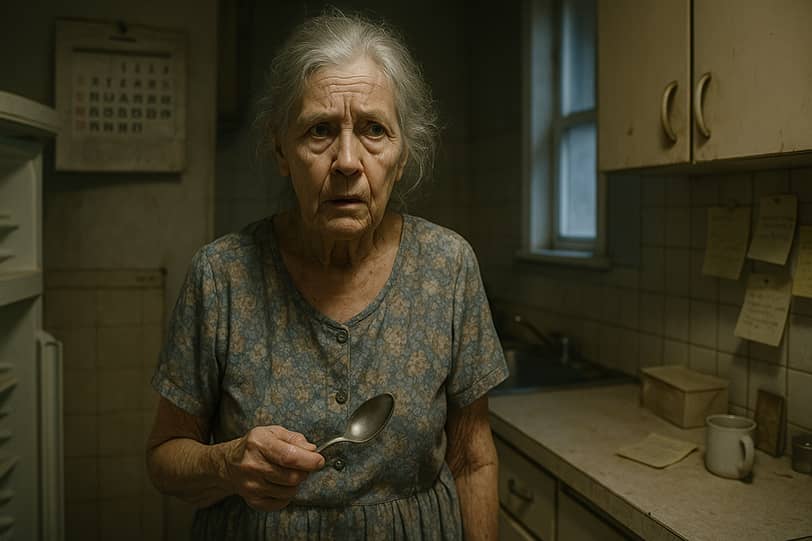
What is senile dementia?
With age, many people notice that their elderly relatives become forgetful, sometimes behave strangely, or lose their former mental sharpness. But where is the line between natural aging and the alarming condition popularly referred to as “senile dementia”? This is not just harmless absent-mindedness, but a serious brain disorder that gradually robs a person of memory, clear thinking, and even basic self-care skills.
In medicine, the term “senile dementia” is not used as an official diagnosis — doctors usually speak of dementia, Alzheimer’s disease, or cognitive impairments. However, the essence remains the same: it is a condition in which the brain literally “refuses” to age with dignity, triggering a process of irreversible changes. Let’s look more closely at what this concept entails, how to recognize the first signs, and how this pathological state differs from normal age-related decline.
Medical explanation: connection with dementia, Alzheimer’s disease, and vascular disorders
Senile dementia is not an independent disease, but a set of symptoms that arise against the background of various pathologies. In 60–70% of cases, it develops due to Alzheimer’s disease — a sneaky disorder in which amyloid plaques form in the brain, destroying neurons. Another common form is vascular dementia, which occurs after strokes or as a result of chronic cerebral blood flow disorders due to hypertension or atherosclerosis.
Less common causes include:
– Parkinson’s disease;
– Traumatic brain injuries;
– Chronic intoxication (e.g., due to alcoholism);
– Vitamin B group deficiency;
– Severe endocrine disorders.
It’s important to understand: unlike temporary impairments after stress or illness, changes in senile dementia are irreversible. Brain cells die and cannot be restored — the process can only be slowed down.
Main symptoms
The manifestations of senile dementia develop gradually, often going unnoticed in the early stages. However, there are key signs that should raise concern:
– Memory loss (short-term, then long-term). At first, short-term memory suffers: the person forgets where they put their glasses, cannot recall what they had for breakfast, or asks the same question repeatedly. Later, old memories fade — the patient fails to recognize relatives and forgets important events from youth.
– Impaired logic, absurd reasoning. Analytical ability declines: the elderly person may put bread in the washing machine, try to pay in a store with toy money, or fail to understand simple instructions. Gradually, critical thinking deteriorates — the patient denies obvious facts (“I didn’t forget, you just didn’t tell me!”).
– Emotional instability (apathy or aggression). Personality changes drastically: a kind person may become irritable, suspicious, or accuse loved ones of theft or conspiracy. Or, on the contrary — they fall into apathy, lose interest in life, and sit motionless all day.
– Loss of daily skills. Complex skills disappear first (using appliances, paying bills), then basic ones: the person forgets how to use a fork, cannot dress themselves, and gets lost in familiar surroundings. In later stages, the patient loses control of physiological processes.
How does it differ from normal aging?
The main difference is the speed and scale of the changes. In normal aging:
– Memory worsens slightly (for example, it takes longer to recall a name);
– The person retains learning ability (can learn to use basic gadgets);
– Critical thinking remains intact (they understand they are forgetful and use reminders);
– Daily skills remain unaffected.
In senile dementia, negative changes progress, stripping the person of independence. If your loved one not only forgets where their glasses are but also no longer understands what they are for — this is a reason to urgently consult a neurologist or psychiatrist.
Important: early diagnosis allows symptoms to be slowed down and quality of life to be preserved for many more years!

Causes: Why Does the Brain “Give Up”?
When we see an elderly person losing touch with reality, a natural question arises: what exactly causes the brain — this perfect “computer” — to fail so drastically? The process of cognitive decline resembles a snowball — many factors lead to it, accumulating over the years. Some causes we can control, others are determined by nature, but understanding these mechanisms is the first step toward prevention.
Modern science identifies three groups of causes of senile dementia: biological (physical changes in brain structure), psychosocial (influence of environment and emotions), and genetic (hereditary predisposition). Let’s examine each of them in detail to understand the complex mechanism of this condition.
Biological factors
– Neuron death, accumulation of amyloid plaques. With age, two destructive processes occur in the brain. First, neurons — the cells responsible for transmitting information — die. Second, beta-amyloid protein accumulates, forming dense plaques between neurons. These “blockages” disrupt communication between parts of the brain. The hippocampus — a kind of “hard drive” where memories are stored — suffers the most. Interestingly, this process can begin 10–15 years before the first symptoms!
– Chronic diseases (hypertension, diabetes, atherosclerosis). Blood vessels are the “roads” through which oxygen and nutrients reach the brain. When they are damaged (in hypertension or atherosclerosis), neurons literally suffocate. Diabetes adds to the problem: high blood sugar destroys small blood vessels. According to statistics, diabetics have a 60% higher risk of dementia. Important: these diseases create a domino effect — for example, hypertension leads to microstrokes, which quietly damage the brain over the years.
Psychological and social aspects
– Loneliness, lack of mental activity. The brain is like a muscle: without training, it weakens. In retirees who stop reading, socializing, and solving problems, neural connections break down faster. A vivid example is the “weekend syndrome,” when an active working person rapidly loses cognitive abilities after retirement. Loneliness worsens the problem — the lack of conversation reduces the production of important neurotransmitters.
– Depression and stress as catalysts. Prolonged stress raises cortisol levels — a hormone that literally “eats away” parts of the brain responsible for memory. Depression reduces the volume of the hippocampus by 10–20%. It’s a vicious cycle: the first signs of dementia cause anxiety, which accelerates the process. Studies show that in people with a history of clinical depression, dementia develops twice as often.
Genetic predisposition
Genes are a lottery. If a person’s parents had Alzheimer’s disease, the risk increases by 30%. Particularly “dangerous” is the APOE-e4 gene: its carriers develop the disease four times more often. However, genes are not a sentence! Even with poor heredity, a healthy lifestyle can delay the onset of the disease by 10–15 years. But rare mutations (as in the familial form of Alzheimer’s) almost guarantee the development of the disease, usually after the age of 50.
An important nuance: these factors rarely act in isolation. A typical story: a man with a hereditary predisposition, suffering from hypertension, withdraws into himself and becomes depressed after retirement — such a “cocktail” accelerates brain destruction many times over. The good news: most of these factors can be influenced!
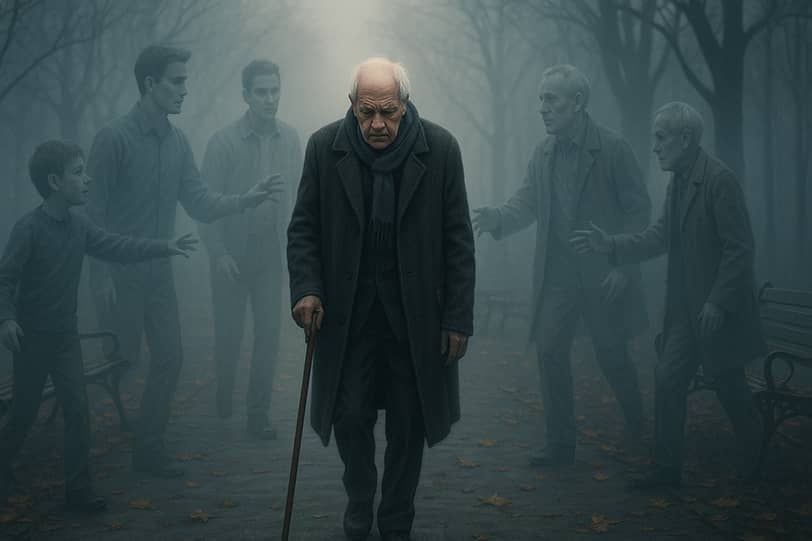
Warning Signs: How to Recognize the Onset?
The insidious nature of senile dementia lies in the fact that it creeps up unnoticed. The first symptoms are often attributed to fatigue, age, or a bad mood. Meanwhile, it is early detection of dementia signs that allows its progression to be slowed down as much as possible. So how can we distinguish ordinary age-related changes from alarming signals of an emerging illness?
It is important to understand: dementia never starts suddenly. It is a gradual process that can be conditionally divided into early and late stages. The first changes are so subtle that only those closest to the elderly person, who communicate with them regularly, may notice them. Let’s take a closer look at what to pay attention to at each stage.
Early signs (easy to miss)
-
Confusion with dates, names
The very first warning sign — minor memory lapses related to recent events. The person may:
– Ask the same question several times.
– Confuse days of the week or months.
– Forget names of not very close acquaintances.
– Lose the thread of conversation.
– Forget scheduled appointments.
Feature: at the same time, old memories remain clear, which often misleads relatives (“the memory is great, remembers what happened 40 years ago!”).
-
Loss of interest in hobbies
You should be alarmed if the person:
– Quits their favorite craft, saying “it’s no longer interesting.”
– Stops following things that were once important to them (sports, politics).
– Refuses to meet with friends.
– Can sit idle all day.
– Becomes indifferent to grandchildren.
Important: this is not just laziness or fatigue, but a loss of the ability to experience pleasure (anhedonia).
-
Suspicion, accusations toward loved ones
Typical behavioral changes:
– Constant accusations of theft (“you stole my glasses!”).
– Conviction that relatives are deceiving them.
– Pathological stinginess (“you want to rob me”).
– Unfounded jealousy.
– Aggression in response to attempts to help.
These symptoms are often explained as a “deteriorated personality,” but in reality, they are manifestations of damage to the brain’s frontal lobes.
Late stages
a) Inability to recognize loved ones
Progressive illness leads to:
– Confusion in family relationships (mistakes son for brother).
– Not recognizing their own reflection in the mirror.
– “Getting stuck” in the past (looking for long-deceased relatives).
– Complete disorientation even among close ones.
b) Delusions, hallucinations
Severe disorders manifest as:
– Talking to “deceased” relatives.
– Belief that someone wants to kill them.
– Seeing “strangers” in the house.
– Accusations about nonexistent events.
– Loss of connection with reality.
c) Complete helplessness in daily life
At the final stage, the person:
– Cannot dress or undress themselves.
– Forgets how to use cutlery.
– Loses control over physiological processes.
– Doesn’t understand where they are.
– Doesn’t respond to spoken language.
Important: If you notice at least 2–3 early signs in your relative — this is a reason to urgently consult a neurologist. Modern medicine can significantly slow the progression of the disease, but only with early diagnosis!
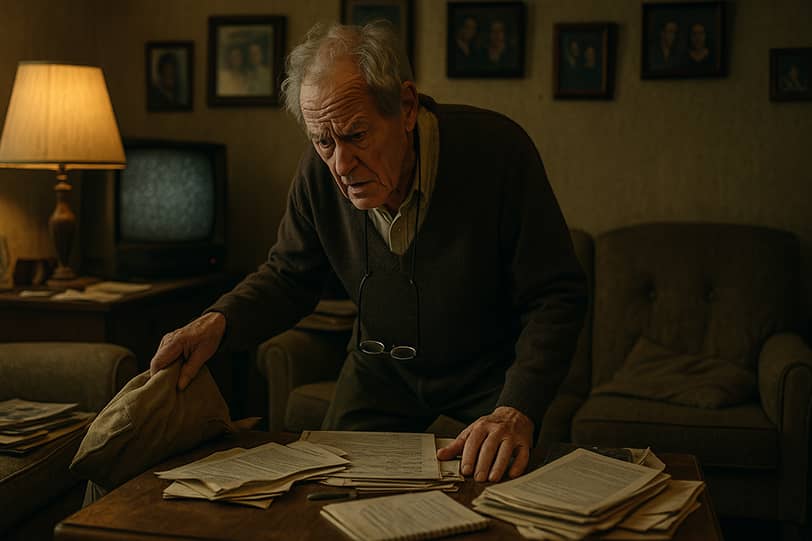
Is It Possible to Slow Down or Prevent Dementia?
When faced with the manifestations of senile dementia in a loved one, the inevitable question arises: could this have been avoided? Modern research proves — although it is impossible to completely prevent age-related changes in the brain, each of us has the power to significantly delay their onset and soften the symptoms. Moreover, prevention should begin not at the age of 70, but much earlier — ideally between 40 and 50 years old.
The good news: even with a genetic predisposition, a healthy lifestyle can delay the onset of dementia by 10–15 years!
The bad news: there is no magic pill — only a comprehensive approach truly works. Let’s take a look at which prevention and treatment methods have proven effective in the fight against cognitive aging.
Prevention
-
Physical activity (improves blood supply to the brain)
Regular physical exercise is one of the most effective ways to maintain mental clarity. It’s enough to have:
– 150 minutes of moderate cardio per week (brisk walking, swimming).
– Strength training 2 times a week.
– Balance exercises (yoga, tai chi).
– Daily morning exercises.
Why does it work? Physical activity increases blood flow to the brain by 15–20%, promotes the formation of new neural connections, and even stimulates hippocampal growth!
-
Cognitive training (reading, learning languages, puzzles)
The brain needs to be constantly “pumped”:
– Learning a new language reduces the risk of dementia by 20%.
– Solving crosswords, sudoku, playing chess maintains logical thinking.
– Reading complex literature (not pulp fiction!) activates different areas of the brain.
– Learning new skills (music, drawing) creates reserve neural pathways.
Important: training must be regular and varied — repetitive tasks quickly stop being effective.
-
Social activity (communication, volunteering)
Loneliness accelerates brain aging by 30–40%. What helps:
– Live communication (not social networks!) 3–4 times a week.
– Participation in interest clubs.
– Volunteering.
– Joint walks with friends.
– Maintaining family connections.
-
Diet (Mediterranean, omega-3, antioxidants)
The optimal “brain diet”:
– Fatty fish (salmon, mackerel) 2–3 times a week.
– Olive oil instead of sunflower oil.
– 5 servings of vegetables and fruits daily.
– Dark chocolate, nuts, green tea.
– Minimal red meat and sugar.
Particularly important are foods rich in omega-3, B vitamins, and antioxidants.
Treatment
-
Medications (nootropics, cholinesterase inhibitors)
When dementia has already developed, the following are used:
– Donepezil, rivastigmine — improve transmission of nerve impulses.
– Memantine — protects neurons from damage.
– B vitamins (especially B12 in case of deficiency).
– Ginkgo biloba — improves cerebral circulation.
Important: medications do not restore dead cells, but can slow disease progression by 30–50%.
-
Psychotherapy for the family (how to cope with the patient’s aggression)
Working with relatives includes:
– Training in methods of communication with dementia patients.
– Techniques to reduce caregiver stress.
– Help in accepting the diagnosis.
– Training in safe care practices.
– Prevention of emotional burnout.
-
The importance of early diagnosis
The earlier the problems are detected, the more effective the treatment:
– After age 50 — annual check-ups with a neurologist.
– Cognitive tests (MMSE, clock drawing).
– MRI at the first symptoms.
– Blood tests for vitamins and hormones.
– Monitoring blood pressure and glucose levels.
Remember: 30% of dementia cases can be prevented or significantly delayed simply by changing your lifestyle! Start prevention today — your brain will thank you in 20–30 years.
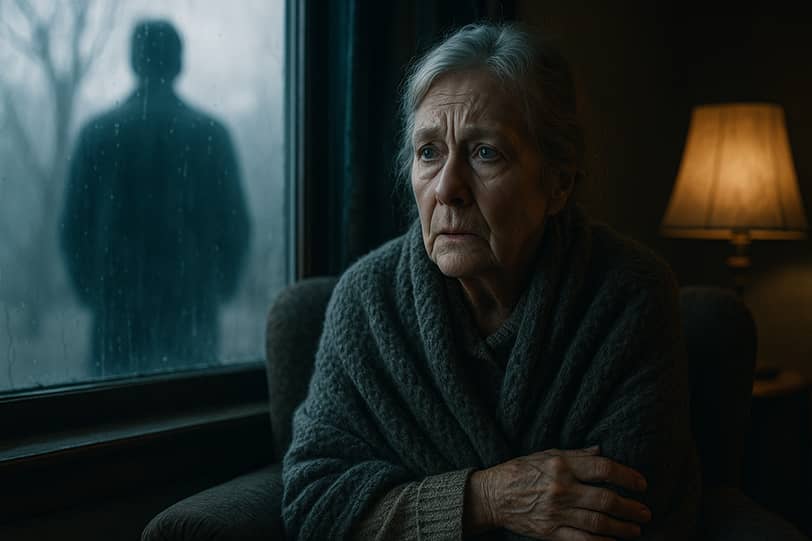
The Hard Truth: How to Live with Such a Diagnosis?
The diagnosis of “senile dementia” or dementia sounds like a sentence — both for the patient and their loved ones. It is a journey into the unknown, where each year, and then each month, a part of a beloved person’s identity disappears. Relatives find themselves trapped between a sense of duty and their own exhaustion, between love and despair. How can you find the strength to go on? How can you preserve human dignity in this difficult trial?
The truth is that dementia changes the entire family. It is not just a disease, but a long-term test of the strength of relationships, patience, and compassion. But even in this situation, support can be found — through understanding the process, legal protection, and community support. Let’s figure out how to survive and remain humane on this difficult path.
For Relatives
-
How not to lose your mind while caring for a patient
Caring for a person with dementia is a marathon lasting years. Here are survival strategies:
– Daily routine — a strict schedule reduces the patient’s anxiety.
– Emotional armor — learn not to take aggression and accusations personally.
– Delegation — divide responsibilities among relatives.
– Breaks for yourself — at least 2 hours a day for rest.
– Support groups — talking with other caregivers gives strength.
Remember: your mental health is a priority. 70% of caregivers develop depression if they do not take care of themselves.
-
Legal aspects (arranging guardianship)
Important steps:
– Living power of attorney — drawn up while the person is still mentally competent.
– Declaration of legal incapacity — through court with medical examination.
– Appointment of guardianship — grants the right to manage the pension and property.
– Disability status — grants access to benefits and free care supplies.
For the Patient
-
Is it possible to remain aware of the disease?
In the early stages — yes. What helps:
– Keeping a diary with reminders.
– To-do and medication planners on the phone.
– Honest conversations with loved ones about the future.
– Recording important memories (photo albums, notes).
– Psychological support.
But as the disease progresses, self-awareness is lost. It is important to make decisions about treatment and care while the mind is still clear.
-
Stories of people who fought
- Story 1: Nikolai, 68 years old. After the diagnosis, he started a video blog about life with dementia. He recorded cognitive exercises and shared his experiences. He managed to retain mental clarity 5 years longer than predicted.
- Story 2: Galina, 72 years old. Organized the club “Dancing Against Dementia” — even with progressing illness, the body remembered movements. Music awakened memories.
- Story 3: A former math professor continued solving simple problems even in the middle stages of the disease — it became his anchor to reality.
These stories prove: even with dementia, one can live meaningfully. The key is activity, accepting support, and finding joy in each day.
Main point: You are not alone. Millions of families are going through this journey. Allow yourself to make mistakes, to feel tired, and to ask for help. Dementia is not only a loss but also a lesson in deep human empathy, which transforms all who go through it.

Conclusion
Senile dementia is a hard test, but it is important to remember: it is not an inevitable companion of old age, but a disease that can and should be fought. Modern medicine is not standing still, and although there is still no way to completely reverse the processes of dementia, we have effective tools to slow its development and preserve quality of life for many years. The key condition is not to turn a blind eye to the first symptoms and to act immediately once warning signs appear.
Caring for brain health is not a one-time effort, but a daily practice that starts long before retirement. Balanced nutrition, physical activity, lifelong learning, and live communication — these are simple but powerful ways to build a “cognitive reserve” that will help the brain resist age-related changes for longer. And if the disease has already affected your loved one — remember, you are not alone: today there are not only medications, but also support communities, accessible psychological help, and professional institutions where the patient can receive proper care.
Old age can indeed be dignified — but only if we prepare for it consciously. Start today: review your habits, get a check-up, talk to your parents about their health. Yes, dementia changes a person, but it cannot erase the years of care and warmth you’ve shared. Let your old age not be a fear of helplessness, but a wise stage of life, for which it is worth preparing with the right knowledge and prevention. As practice shows, even small lifestyle changes today can give you and your loved ones additional years of clear thinking and the joy of connection tomorrow.
